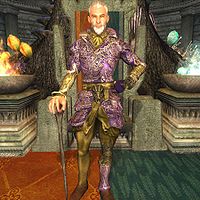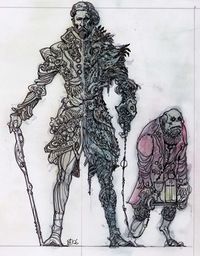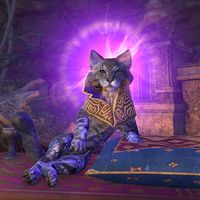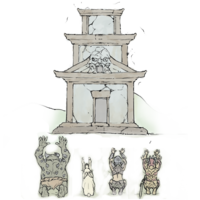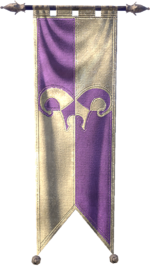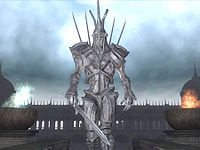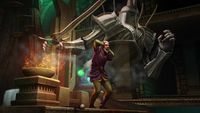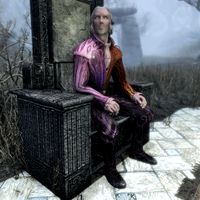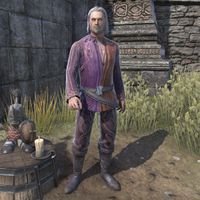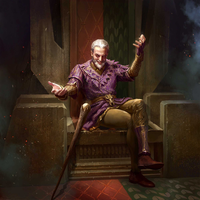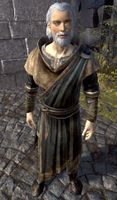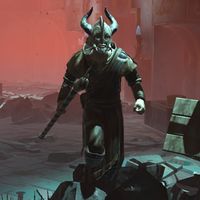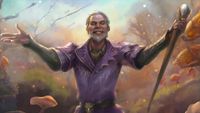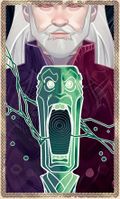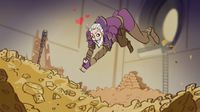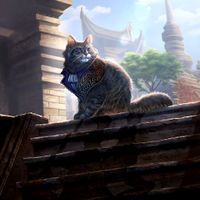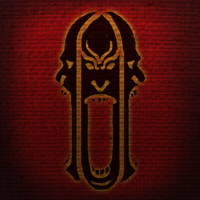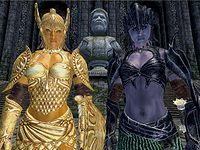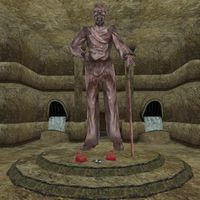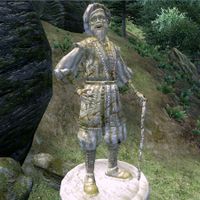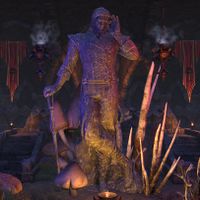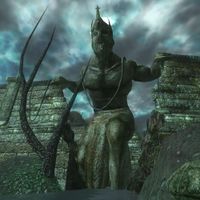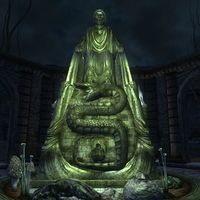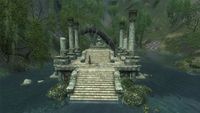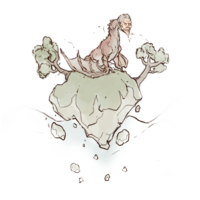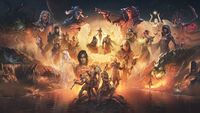Lore:Sheogorath
- "I am a part of you, little mortal. I am a shadow in your subconscious, a blemish on your fragile little psyche. You know me. You just don't know it ... You can call me Ann Marie. But only if you're partial to being flayed alive and having an angry immortal skip rope with your entrails. If not, then call me Sheogorath, Daedric Prince of Madness. Charmed." — Sheogorath[1]
Sheogorath is the Daedric Prince of Madness,[2] Fourth Corner of the House of Troubles,[3] the Skooma Cat,[4] Lord of the Never-There, Raver,[5] Comforter of Men,[6] The Trickster,[7] and Sovereign of Shivering Isles.[8] His sphere is madness and creativity,[9] and his motives are said to be unknowable.[2] He is sometimes referred to as the Mad Star, the Mad Lord, the Mad One, the Mad God (or Dam Dog), and Uncle Sheo among other things.[10][11][12][UOL 1] His realm, best known as the Shivering Isles,[13] has also been called the Madhouse. It's believed that those who go there lose their sanity forever.[14][nb 2] Of course, only the Mad God himself may decide who has the privilege to enter.[15] The Golden Saints, or Aureals, and Dark Seducers, or Mazken, are his servants.[16] The Mad God typically manifests on Nirn as a seemingly harmless, well-dressed man often carrying a cane, a guise so prevalent it has actually been coined "Gentleman With a Cane".[9] "Fearful obeisance" of Sheogorath is widespread in Tamriel, and he plays an important part in Dunmeri religious practice.[17][18] Sheogorath's summoning day falls on Mad Pelagius day, which is the 2nd of Sun's Dawn.[19] However, there is a chance he can be summoned on another Daedric Prince's summoning day if there is a storm on that day.[20]
Stories of Sheogorath[edit]
- "A change is coming. Everything changes. Even Daedric Princes. Especially Daedric Princes."[21]
Sheogorath owes his origin to his fellow Daedric Princes, for he was formerly Jyggalag, the Daedric Prince of Order. In times beyond memory, Jyggalag had vastly grown in power, and his influence spread across the seas of Oblivion. The other Daedric princes grew jealous and fearful and cursed Jyggalag to live as Sheogorath, the incarnation of the thing he hated most. The curse did allow Jyggalag to return in his true form at the end of every Era, and reconquer his lands, an event known as the Greymarch. After that, however, he would be transformed back into Sheogorath, and Sheogorath would spread madness upon his lands once more.[13]
Sheogorath is one of the first four Daedric Princes mentioned in written history,[22] They say he is the "Sithis-shaped hole" of the world brought into being when Lorkhan's divine spark was removed.[17] One superstition is to avoid thunderstorms, for they belong to Sheogorath.[11] Another is that madmen are driven to that state by speaking with Sheogorath, who gives them advice and information which is beyond their capacity to know.[23] History is littered with stories of worshippers of Sheogorath doing great harm to themselves and others,[24] as well as mortals succumbing to madness thanks to his efforts and those of other daedra.[25][26] Such people are said to be "touched by Sheogorath",[27] or "Sheogorath-kissed".[28]
Sheogorath is, above all, unpredictable. He is the type of deity that does things on a whim to quench his boredom, such as indulging in a sadistic pleasure and treating everyone as a plaything. A great number of myths, stories, and legends notably reflect this. Sheogorath's favorite passtime is torture, [29] and Sheogorath himself claims to have spent his first three to four thousand years of existence tormenting butterflies, before eventually growing out of it.[4] Butterflies are now associated with him, serving as a sign of his influence.[30] New Sheoth, the divided capital of the Shivering Isles, is said to have been founded at his whim.[15] Myths of Sheogorath is an anthology of tales that serves as another example: "Sheogorath Invents Music" (from the body parts of a young woman), "Sheogorath and King Lyandir" (who was killed by his deranged son after his entire kingdom fell to madness), and "The Contest of Wills" (which Sheogorath wins without even trying). Fall of Vitharn tells the tale of a Count in the Shivering Isles who disrespected Sheogorath, and who Sheogorath rewarded with an overabundance of madness in his family, leading to their demise. While his fellow Daedric Princes feared Jyggalag's raw power, they must fear Sheogorath's cunning. 16 Accords of Madness are stories of Sheogorath's encounters and inevitable triumphs over other Daedric Princes, such as besting Hircine in a duel of champion beasts (by letting Hircine's beast maul itself to death), winning a wager with Vaermina (by doing nothing), and claiming the soul of an Orc who had murdered one of his followers (by letting Malacath do the work and kill the Orc, who turned out to be Malacath's own son). The general theme is that he lets his opponents defeat themselves, remaining impervious and yet doing relatively little unless he's in a bout of (often violent) creativity.[31] Sheogorath has also sentenced a man to death for the crime of trying to grow a beard.[8]
Sheogorath is fond of threats, in particular, ones written on the back of an Argonian concubine.[1] He hates indecision, or maybe he doesn't.[32]. His title of Mad God is also one which gets passed down from Sheogorath to Sheogorath every few thousand years.[33] Sheogorath's favored weapons are the sword and crossbow.[34]
Religion and Culture[edit]
Khajiit[edit]
Sheogorath is one of the many prominent Daedric Princes in Khajiiti culture.[17] To them, he is "Sheggorath",[35] a crook-tailed Cat who shares his madness with sugar-tooths through skooma,[36] a hallucinatory narcotic[37] that is known to leave its victims in a constant, alternating state of delusional euphoria and lethargy.[38] Indeed, he is known as the Skooma Cat, "for nothing is madder than a cat on skooma".[35]
The Khajiit believe he was born from the union of Ahnurr and Fadomai, from whose union all the God Cats came, including Sheggorath.[36] Pre-ri'Datta texts state that he is an adversarial spirit that tests Khajiit on the Path by making them doubt the truth of their own thoughts, beliefs, and actions. He must be faced along the Path and be overcome before a Khajiit can visit Hermorah's library. Some ancient Khajiit tribes believed Sheggorath is dead and has been replaced by something Other.[39] The Skooma Cat takes the form of an Alfiq, and acts more like a common housecat than a Khajiit. For instance, he is easily distracted by yarn.[4]
One of the earliest documented encounters with Sheggorath was once told in the now lost tale of Khunzar-ri and the Skooma Cat.[40]
Chimer/Dunmer[edit]
Sheogorath is believed to have accompanied the Chimer on their exodus to Morrowind.[17][18] However, when the Tribunal Temple took power in Morrowind, Sheogorath, as well as Mehrunes Dagon, Malacath, and Molag Bal, became known as one of the "Four Corners of the House of Troubles" to the Dunmer and called the Prince of Fools.[UOL 2] It is written that when he rebelled against the Tribunal, the worship of Sheogorath became punishable by death.[18][nb 3] Sheogorath rebelled by tricking the moon Baar Dau, inspiring it to hurl itself at the city of Vivec, and justified his actions by claiming Vivec was built in mockery of the heavens. Vivec is then said to have frozen Baar Dau in its descent with one gesture; the moon then swore itself to the Tribunal's service forever.[10] Nonetheless, Vivec apparently made an agreement with Sheogorath to protect his people from madness, an agreement the Dunmer must occasionally renew by performing the Pilgrimages of the Four Corners. Sheogorath's shrines were abandoned, but many have remained standing into modern times.[41] Legends say Daedra Lords such as Sheogorath built the great shrines themselves because mortals could not build anything grand enough to suit them.[12] After the Nerevarine destroyed the Heart of Lorkhan and Vivec disappeared, Baar Dau eventually resumed its descent, destroying Vivec City, fulfilling its original goal, and instigating the disasters of the Red Year.[42]
Dunmer believe Sheogorath tests them for psychological weakness. In many legends, he is called upon by one Dunmer faction against another, though whether he betrays or helps those who call him proves unpredictable. They often associate him with the fear other races have of them, especially those who might prove useful allies.[18] Though nascent for thousands of years in Morrowind, Sheogorath worship began picking up again following the Armistice with the Empire, and his shrines began receiving more visitors as more and more Dunmer fell into "dark worship".[43]
Followers[edit]
The Jester's Festival is an annual holiday that falls on the 28th of Rain's Hand.[44] The origins of the Jester's Festival are speculated, with some believing that it originated with Sheogorath once turning the whole world mad.[45] Indeed, there appears to have some association with Sheogorath, as the Daedric Prince Sanguine himself once manifested under the alias of a Breton named "Samuel Gourone" during the celebration to spice it up in honor of his daedric sibling, calling him the Cheese Prince.[46] Daedric cultists visit the Shrine of Sheogorath during the Festival of the Mad; this tradition may be local to Valenwood.[47]
The Blessings of Sheogorath, a prayer among Sheogorath worshippers, asserts that without Sheogorath, "all thought would be linear, and all Feeling would be fleeting". They praise him because it is Sheogorath "who tricks us when we are foolish, punishes us when we are wrong, tortures us when we are unmindful, and loves us in our imperfection".
Within the Shivering Isles themselves, society functions similarly to Tamriel - but with obvious and glaring exceptions, of course. The mentally ill, bifurcated populace have held a range of beliefs about Sheogorath.[13] Some Zealots revered him as a living god,[48] while others, labeled Heretics, thought he was nothing more than a mortal impostor.[49] Some urged armed uprising,[50] and many committed various deranged acts in attempts to gain his favor.[13]
Sheogorath devised a unique spell called Manipulate Weather, and has been known to teach this spell to his most favored followers. The spell allows the manipulation of the climate within an entire region. Sheogorath himself determines the weather effects the spell produces, and the spells effects are random. For example, those trying to summon a flash flood may instead summon a torrential rain storm.[51]
Some say that Grummites worship Sheogorath, though this has never been proven.[52]
History[edit]
First Era[edit]
In the early First Era, Shalidor established the island of Eyevea as a retreat and sanctuary for all mages. However, in the time period roughly around the Twenty-Third Century of the First Era,[53] Shalidor wagered Eyevea to Sheogorath for the Folium Discognitum, a tome of knowledge which he had been obsessed with obtaining. Shalidor lost, and the island was duly spirited away to the Shivering Isles, where it would remain for thousands of years. Shalidor went on to regret wagering the island, feeling that he had been tricked by the Mad God.
Between the 3rd and 5th of Rain's Hand, 1E 2920[54], Sheogorath, along with seven other powerful Daedric Princes, entered into a contract known as the Coldharbour Compact with the Tribunal God Sotha Sil. Little is known about the Compact but it is theorized that it prevents the Princes from directly manifesting on Nirn. It is also speculated that, in order to secure the agreement of the Princes, Sotha Sil either made a credible threat to them or presented a significant offer in exchange.[5][55]
Second Era[edit]
In 2E 582, the Mages Guild was expelled from Cyrodiil and became fractured due to the Alliance War, despite claiming neutrality in the war. Although he had had nothing to do with the guild in life, Shalidor returned to the affairs of mortals in order to win back Eyevea from Sheogorath so that it could serve its original purpose and act as a sanctuary for the guild.[56]
Sheogorath agreed to give Shalidor the means of reclaiming the island if his champion agreed to complete four trials for the Prince's amusement. An adept of the Mages Guild agreed to undertake the Trial of Eyevea, and was then subjected to various inane tests. At the end of each trial, the guild was given a tome containing clues to returning Eyevea to Mundus. Valaste, the guild's Master of Incunabula, took on the burden of decrypting these books, as Shalidor himself was forbidden to read them. The guild was eventually successful in restoring the island, but as a final test, Sheogorath neglected to remove Eyevea's Daedric guardians before returning it. As such, it was swarming with Golden Saints and Dark Seducers, which needed to be cleared out. With that done, the adept was forced to fight Haskill to finally clear the island of Sheogorath's influence.[56]
In the same year, Sheogorath turned his gaze to Southpoint, and took advantage of a disgruntled mayor who claimed to have lost his birthright. The mayor demanded power to gain the respect he needed for his position, but Sheogorath instead cursed his tongue with madness, and let him make a mess of the town. With madness pouring into Southpoint, its citizens began killing one another in the streets and Dominion soldiers cordoned off the town. The Vestige ended the madness, dealing with both the corrupt Imperial mayor and the Daedric Prince, and the city remained in the Dominion until its eventual dissolution.[57]
Soon after, Sheogorath donned the guise of the Skooma Cat and ravaged the Two Moons at Tenmar Temple in Anequina. To receive a premonition or message from the Twin Moons, instead of using moon sugar in her ceremony, the temple's moon-bishop had used the dangerous narcotic skooma, and Sheogorath came to her. He plotted to convince the priests to blind themselves with the Fork of Horripilation in order to be hidden from the dragons that plagued Elsweyr. Sheogorath was stopped by the Vestige, who located and confiscated the Fork, and rescued the Moon-Bishop from his clutches.[58]
Sometime before 2E 582,[59] the witch Naenra Waerr created the sword Umbra[60] at the request of Clavicus Vile, who wanted the sword as a tool of mischief which would send him souls from the mortal realm.[61] Naenra created the sword, but it was unstable, requiring Vile to give the witch a piece of his power to be imbued in the sword in order to stabilize it. However, Naenra (sometimes credited with being Sheogorath in disguise) supposedly tricked him, as the piece of Vile's power imbued in the sword became a sentient being which called itself Umbra. Naenra was executed for her evil creation, but the sword remained behind, becoming the identity to those unfortunate enough to wield it.[61]
Third Era[edit]
In the events leading up to the Warp in the West, an unknown agent of the Blades summoned Sheogorath and dispatched a battlemage who had displeased the Prince. In return, the agent was given the Wabbajack by a worshipper of Sheogorath.[62]
Sheogorath is a known visitor to the Blind God's realm of Mantellan Crux within Aetherius. Sheogorath, who was visiting the Blind God at the time, aided the Agent of the Blades retrieve the Mantella. [63] Because of this, Sheogorath inadvertently played a key role in the events that led up to the Warp in the West.[64]
In 3E 427, Sheogorath tasked the Nerevarine with retrieving the Fork of Horripilation from Big Head, a mad Argonian hermit and a worshipper of Sheogorath who lived in a small shack on an island in the Sheogorad region of Morrowind. Sheogorath instructed the Nerevarine with an odd task, to kill a giant Bull Netch with the fork. Big Head willingly gave the fork to the Nerevarine, who then killed the Bull Netch and returned the fork to Sheogorath, and was rewarded with the Spear of Bitter Mercy.[65] How Sheogorath came into possession of the spear is unknown.
In 3E 433, Sheogorath was aided by the Hero of Kvatch in tormenting the Khajiit settlement of Border Watch in Cyrodiil. The inhabitants were very superstitious, and were driven into a state of frenzy when the Prince simulated their K'sharra Prophecy, said to mark the end of the world. These occurrences were reported in a special edition of the Black Horse Courier newspaper entitled Rain of Burning Dogs!.[66][67] It is unknown whether this took place before or after the Hero assumed the position of Sheogorath; regardless, the Hero received the Wabbajack from either Sheogorath or Haskill.[66]
- "The Greymarch comes, and Jyggalag walks. Or runs. Never skips, sidles, or struts. Mostly, he just destroys everything around him."[21]
At the end of the Third Era, in order to deal with the coming Greymarch that threatened to destroy the Shivering Isles once again, Sheogorath manifested a portal upon the Niben Bay, and invited a champion into the Isles. As the portal was an invitation and posed no danger to Mundus, the Coldharbour Compact was not violated. [68] The Hero of Kvatch mantled Sheogorath, and defeated Jyggalag and the forces of Order.[13][UOL 3] In doing so, the Hero finally broke the cycle, and Jyggalag himself stated he was free from the curse.[13] Nonetheless, the "Gentleman With a Cane" continued to stroll through Tamriel, and, as always, one can never be sure what his visits will bring.[69]
Fourth Era[edit]
Although Sheogorath is known to outplay his opponents, legends tell of a Dunmer by the name of Talym Rend who sometime in the Fourth Era[nb 4] beat the Mad God at his own game. Talym struck a deal with Sheogorath: make him forget his involvement in the death of his son, Novos. Sheogorath agreed, then tampered with his memories so he thought he was fighting to cure his son of madness instead.[70] The Prince requested three souls to be driven mad in return for restoring Novos to sanity. When he had done as directed, Talym returned home only to realize that Novos had been dead the entire time. Sheogorath denied Talym another audience when he returned to the Shivering Isles, and Talym wandered around the realm aimlessly, slowly driving himself mad with unanswered questions. Eventually, he regained a semblance of composure and journeyed to Knifepoint Hollow. There, Talym was informed by Dyus, the librarian of Jyggalag, that he might gain an audience with Sheogorath if he retrieved an artifact of Jyggalag. Sheogorath finally granted Talym an audience when he retrieved the Sword of Jyggalag, and used the Memory Wand on him to reveal Talym's original intent and memories. Sheogorath mocked Talym, and in his anger, Talym turned the Memory Wand against Sheogorath and forced him to recall his memories of his previous incarnation: the Daedric Prince of Order, Jyggalag. The memories pained Sheogorath, who pleaded with Talym to stop. He fulfilled Talym's wishes and let him and his companions free from his grasp.[71]
Circa 4E 180,[72] Sheogorath disguised himself as a mad Breton by the name of Theodor Gorlash (an anagram of "Lord Sheogorath"),[nb 1] and encouraged the Warrior to enter a portal outside the town of Rivercrest. The portal led to the Abyss, a mysterious realm of Oblivion consisting of a never-ending series of rooms and corridors, both real and unreal at the same time, which together form an endless dungeon.[73]
In 4E 201, the former Bosmer High Priest of Mania, Dervenin, who at the time seemed like a simple beggar, convinced the Last Dragonborn to assist him in finding his master. This resulted in the Dragonborn unknowingly entering the mind of the dead Pelagius Septim III, tasked with convincing Sheogorath to return to the Shivering Isles. He agreed to return them, but only if the Dragonborn could escape Pelagius' mind. Sheogorath decided to assist the Dragonborn by providing the Wabbajack, along with instructions on how to use it to remedy Pelagius of his insanity. Having completed several challenges and conquering the dead emperor's inner fears, the Dragonborn was able to return to Tamriel, but not before being given the Wabbajack by Sheogorath as a parting gift.[74]
Artifacts[edit]
- "Take this trinket of mine. Perhaps it will serve you well. Or look lovely on your corpse."[21]
Below are a variety of artifacts that are associated with Sheogorath. There are many minor artifacts and trinkets linked to him, including the About Face,[75] Asylum Earplugs, Big Sister & Little Brother, Ceremonial Cheese Knife, Discordant Fiddle, Embittering Muzzle, Eidar Scrolls: The Merethic Cheeses Vol. 2, Longsleeves, Lucid Liquor, Mad God's Lost Button, Madman's Chalice, Nightlight, Tintinnabulic Crystal of Reminiscence,[UOL 4] Uncle Leo's Spectacles, and Wabbajerky.[76] Aside from these, Sheogorath has also stolen the artifacts of other Daedric Princes in the past. The most notable of these occurrences is the wave of thefts he did in 2E 582, which resulted from his boredom of the bloodshed in the Three Banners War. To mend his boredom, he stole other Princes' artifacts for the purpose of putting a spin on Daedric interference, and to mess with his Daedric siblings for the fun of keeping them on their guard.[77]
Cold Finger[edit]
Cold Finger is powerful magical staff said to have been created in the Shivering Isles by Sheogorath himself. The staff was owned by Dervenin for a while, but due to a cruel joke his mad master played on him, the staff ended up with a Giant Skeever. Eventually, the Giant Skeever was defeated by warriors from Odar's Kingdom, to which Dervenin turned for help, but the local ruler decided to keep the staff rather than return it to Dervenin.[78]
Folium Discognitum[edit]
The Folium Discognitum is a Daedric artifact created by Sheogorath. It is a tome of knowledge, filled with insights compiled from the ramblings of madmen. The pages bear near incomprehensible scrawls that move to avoid your gaze when read. The power obtained from reading these insights is the equivalent of absorbing at least six skyshards.
Fork of Horripilation[edit]
The Fork of Horripilation is a cursed artifact created by the Daedric Prince Sheogorath, who refers to it affectionately as Forky. In appearance and in function, it is a mundane iron fork. However, it is imbued with an enchantment which excites and synergizes magicka around it, and can produce dramatic results when held by certain people. Sheogorath is fond of forcing mortals to use it as a weapon, in which case it curses the wielder with Fork's Wound, a magical effect which stunts the wielder's magicka or drains it completely. The term horripilation refers to the standing of hairs on end due to cold, fear, or excitement. In the context of the fork, excitement arises within Sheogorath when he convinces mortals to use the fork, while fear is evoked in mortals from just touching it, resulting in horripilation. The Fork smells lightly of roast beef.
Gambolpuddy[edit]
Gambolpuddy, also known as the Ambiguous Glove, is an extravagant right glove belonging to Sheogorath, the Daedric Prince of madness and one of the Daedric Princes seen as the Bad Daedra by the Dunmer. It fortifies abilities (Agility, Intelligence, Personality, Luck) at the cost of draining others (Endurance, Speed, Strength, Willpower). Its main role is ceremonial, and is to be used as a sacrificial offering to Sheogorath's shrine in Ald Daedroth, in order renew a pact with Sheogorath to limit his influence on the Dunmeri people. Gambolpuddy is not limited to the confines of Ald Daedroth, and is known to be a recurring artifact.
Memory Wand[edit]
The Memory Wand is an artifact created by the Daedric Prince of Madness, Sheogorath. It is intended to be used by him for the fun of causing a victim to go mad by altering, deleting, and causing them to relive painful memories. This can be done in such a way that the victim will question their own reality. Its physical appearance is describable as a large metallic rod adorned with a double sided figure of a horned madman, with blue flames coming out of its head.
Neb-Crescen[edit]
Neb-Crescen is a cursed sword created by Sheogorath that causes its wielder to be filled with reckless abandon, compelling them to kill everyone in a fit of rage when they hold it. The 16 Accords of Madness describes it as being a seductive wide "arc of honed steel" that is intricately decorated, such as being adorned with jewels, having a beautifully decorated handle, and even having a practicality in its elaborate pommel, which is designed to balance its considerably hefty weight. It is most known for being used against Malacath to trick him into murdering his own son.
Sheogorath's Regalia[edit]
Sheogorath's Regalia is the distinctive dapper clothing of the Daedric Prince Sheogorath, which he uses so prevalently along with a cane, that this guise has been dubbed the "Gentleman With a Cane". Fitting of his alias, his attire varies depending on the occasion, and he may even opt to using a multihued turban. He is well dressed even in his Alfiq form of the Skooma Cat. Should he wish to cross gender boundaries, he may even opt to use a dress should he wish to present himself as female. But when he wishes to remain subtle, he may drop the regalia altogether.
It is enchanted to increase the wearer's luck, personality, and speechcraft.
Staff of Sheogorath[edit]
The Staff of Sheogorath, a powerful Daedric artifact, is the symbol of the Daedric Prince of Madness. It contains the power of the Shivering Isles, and is needed to assume the title of Mad God and sit upon the Throne of Madness.
The Staff is the namesake of Sheogorath. In its traditional appearance, the Staff is a simple walking stick, often with an eyeball attached to the top. During each Greymarch, the Staff's power waned and it became a useless twig. This marked the beginning of Sheogorath's transformation into Jyggalag.
Staff of the Everscamp[edit]
The Staff of the Everscamp is a Daedric staff adorned with metallic scamps at its tip and inscribed with Daedric lettering spelling out the word "nonsense". It's a recurring artifact primarily associated with Sheogorath, though some evidence suggests a connection with Namira. The staff was created in Darkfathom Cave's shrine, located in Cyrodiil's Blackwood. Its purpose is to hinder those unfortunate enough to wield it. It summons "Everscamps", which, like the name suggests, are scamps whose presence is permanent, as they will immediately rematerialize post-mortem. Additionally, the staff will slow down the speed of its wielder. Finally, the staff will compel its user not to dispose of it, a curse only reversible by returning it to the shrine in Darkfathom Cave.
Wabbajack[edit]
The Wabbajack is a Daedric artifact created by the Daedric Prince Sheogorath. It takes the appearance of a Daedric staff that is usually engraved with angry gaping faces at the top. As befits the Prince of Madness, his artifact is unpredictable in its effects. The staff has the power to transform its target into a completely random creature. This can be helpful to the wielder, turning a fearsome opponent into a docile animal; similarly, it can be detrimental, transforming a relatively weak enemy into a powerful monster. The staff can produce other effects, such as damaging, healing, turning to stone, or instantly killing the target. The staff's victims that are turned into animals, and are cooked after the fact, become the meat known as Wabbajerky. The meat has created debates on whether eating it would be considered cannibalism. Sheogorath finds only a few worthy of Wabbajack's "absurdly sweet power".
The Shivering Isles[edit]
- "Change will preserve us! It is the lifeblood of the Isles. It will move mountains! It will mount movements!"[21]
The Shivering Isles, also called the Realm of Madness, the Madhouse, or the Asylums, is the Daedric realm of Sheogorath, Prince of Madness. The realm consists of a main landmass surrounded by a group of smaller islands, the area of which is divided in half: the northern half of these lands is called Mania, and the southern half Dementia. This divide represents Sheogorath's split personality, the "two shades of madness". The isles are inhabited by mortals as well as Daedra, but they have been driven insane.
Associated Servants and Creatures[edit]
The most iconic Daedric servants of the Mad God are the Aureal and Mazken, both rival daedra with matriarchal societies that look down on males as inferiors. They each make up half of Sheogorath's army, with the Aureal serving the denizens of Bliss, and the Mazken doing the same for the denizens of Dementia.[79][80][81] Although Hungers are typically associated with Boethiah, they are known to inhabit the isles as servitors and guards and are said to be the perfect representation of Sheogorath's darker side.[82] Ravenous Rodents are tiny daedrats that stare with forlorn eyes, considered to be Sheogorath's pests. They chitter quietly, and those who listen carefully may be able to understand what they have to say, with great calamity befalling those who listen to their lies.[76][83]
The Shivering Isles are home to creatures that are seemingly not Daedric in nature, such as the large mantis-like Elytra, and the Spriggan-like Gnarl. The most unique fauna are the Grummites, frog-like beastfolk with a complex life cycle.[84]
Gallery[edit]
Appearances[edit]
Misc[edit]
-
Zealot shrine to Sheogorath in the Shivering Isles
(Shivering Isles)
Notes[edit]
- The Temple of Mad God is a location present in the Summerset Isle, near Lillandril in the Third Era.[86]
See Also[edit]
- For game-specific information, see the Daggerfall, Morrowind, Oblivion, Shivering Isles, Skyrim, Elder Scrolls Online, Legends, and Blades articles.
Books[edit]
- 16 Accords of Madness — Accounts of meetings between Sheogorath and the other Daedric Princes
- The Blessings of Sheogorath — The 13 Blessings of Sheogorath
- The House of Troubles — Chronicle of the Daedra who decided not to submit to the Tribunal
- Myths of Sheogorath by Mymophonus — Magical myths about the Madgod himself
- Saints and Seducers by Andoche Marie — Sentinels of the Isles: A treatise on Golden Saint / Dark Seducer culture and history within the Shivering Isles
- Varieties of Faith... by Brother Mikhael Karkuxor of the Imperial College — An expansive list of the pantheons and associated divine spirits of Tamriel's dominant cultures
References[edit]
- ^ a b Sheogorath's dialogue in Skyrim
- ^ a b The Book of Daedra
- ^ Tholer Saryoni's dialogue in Morrowind
- ^ a b c Skooma Cat's appearance in ESO: Elsweyr
- ^ a b The Coldharbour Compact
- ^ Pocket Guide to the Empire, 1st Edition: Invocation — Imperial Geographical Society, 2E 864
- ^ The Trickster in Blades
- ^ a b Death Decree
- ^ a b Myths of Sheogorath — Mymophonus
- ^ a b The Pilgrim's Path — Tribunal Temple
- ^ a b Invocation of Azura — Sigillah Parate
- ^ a b Sinnammu Mirpal's dialogue in Morrowind
- ^ a b c d e f Events of The Shivering Isles
- ^ The Doors of Oblivion — Seif-ij Hidja
- ^ a b Guide to New Sheoth — Brenith Aralyn
- ^ Saints and Seducers — Andoche Marie
- ^ a b c d Varieties of Faith... — Brother Mikhael Karkuxor of the Imperial College
- ^ a b c d The House of Troubles
- ^ Holidays in Daggerfall
- ^ Daedra summoning in Daggerfall
- ^ a b c d Sheogorath's dialogue in Oblivion: Shivering Isles
- ^ On Oblivion — Morian Zenas
- ^ Chance's Folly — Zylmoc Golge
- ^ The Liturgy of Affliction — Anias Gae (transcribed)
- ^ Feyfolken — Waughin Jarth
- ^ Fall of Vitharn
- ^ Rislav The Righteous — Sinjin
- ^ Pocket Guide to the Empire, 3rd Edition: All the Eras of Man, A Comprehensive History of our History — Imperial Geographical Society, 3E 432
- ^ Dialogue in the mission Tortune Fun in Legends
- ^ Elazura's and Naraku dialogue in ESO: Elsweyr
- ^ 16 Accords of Madness
- ^ Loading Tips tips in Legends
- ^ Chaos Arena matchmaking messages in Legends
- ^ Sheogorath's dialogue in Daggefall
- ^ a b Words of Clan Mother Ahnissi — Clan Mother Ahnissi
- ^ a b Priest Haduras' dialogue in ESO
- ^ The Improved Emperor's Guide to Tamriel: Elsweyr — Flaccus Terentius, 2E 581
- ^ Pocket Guide to the Empire, 1st Edition: The Elsweyr Confederacy — Imperial Geographical Society, 2E 864
- ^ The Adversarial Spirits — Amun-dro, the Silent Priest
- ^ Khunzar-ri's dialogue in ESO
- ^ Events of Morrowind
- ^ The Infernal City — Greg Keyes
- ^ Dark Elf dialogue in Morrowind
- ^ Jester's Day description in Daggerfall
- ^ Jester Queen Ayrenn's dialogue in ESO
- ^ Getting the Band Together quest in ESO
- ^ Gwinas' dialogue in Oblivion
- ^ Zealotry
- ^ Heretical Thoughts
- ^ Bark and Sap
- ^ War Weather
- ^ Rumors in Oblivion: Shivering Isles
- ^ Loremaster's Archive - Scribing — Votary Nahila
- ^ 2920, Rain's Hand — Carlovac Townway
- ^ Sotha Sil's dialogue in ESO: Clockwork City
- ^ a b Events of the Mages Guild questline in ESO
- ^ The Grip of Madness quest in ESO
- ^ The Lunacy of Two Moons quest in ESO
- ^ Description of the Witchwise Headdress
- ^ Tamrielic Lore — Yagrum Bagarn
- ^ a b Lord of Souls — Greg Keyes
- ^ Events of Daggerfall
- ^ Events of Journey to Aetherius
- ^ Events of Daggerfall
- ^ Sheogorath's Quest in Morrowind
- ^ a b Events of Oblivion
- ^ Rain of Burning Dogs!
- ^ Haskill's dialogue in Oblivion: Shivering Isles
- ^ Events of Skyrim
- ^ Dialogue in the mission The Final Battle in Isle of Madness
- ^ Events of Isle of Madness
- ^ Junius the Elder's dialogue in Blades
- ^ Theodor Gorlash's dialogue in Blades
- ^ Events of Skyrim
- ^ The About Face item description
- ^ a b Alvur Baren's dialogue during Madness in Tamriel in ESO
- ^ Sheogorath's dialogue in the quest Chaos Magic in ESO
- ^ Event Skeever of Unusual Size in Castles
- ^ Golden Saint's information in Oblivion: Shivering Isles
- ^ Dark Seducer's information in Oblivion: Shivering Isles
- ^ Saints and Seducers — Andoche Marie
- ^ The Shivering Bestiary — Namlir Esprink
- ^ The Words of the Rodent
- ^ Baliwog in Oblivion: Shivering Isles
- ^ A Child's Tamriel Bestiary — Shane gro-Orath (Clever, no? Ha, ha!)
- ^ Corim Ashlen's dialogue in Arena
Note: The following references are considered to be unofficial sources. They are included to round off this article and may not be authoritative or conclusive.
- ^ Mad God's Masque and Bellicose Ball
- ^ Morrowind Concept art
- ^ Kurt Kuhlmann's comments on Decrypting The Elder Scrolls Game Informer article
- ^ Ted Peterson's Posts
- ^ Daggerfacts at The Imperial Library
- ^ Imperial Census of Daedra Lords — the Imperial Geographic Survey
|
||||||||
|
|||||||||||||||||||||||
|
||||||||||||||||||||||||||||||||
|
|||||||||||
